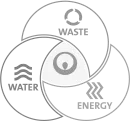Winter storms and freezing temperatures can be dangerous. It's important to take some steps to keep yourself safe and healthy. Be ready for power outages and any outdoor activities you've got planned. Oh, and don't forget to check on your little ones, older folks, and anyone who's not in the best of health.
Even though we know winter is on its way, a lot of us might not be completely ready for it. But if you take the time to prepare for all the winter hazards, you'll have a way better chance of staying safe and healthy when the temps start dropping.

Veolia is uniquely positioned to service industry, government and commercial entities in improving performance, managing water, waste and energy.
Learn how
Prepare your home
Get your home winter-ready by taking a few important steps. Start by winterizing your home to keep the cold air out and the warm air in.
- Install weather stripping, insulation, and storm windows to keep the drafts at bay.
- Insulate water lines that are near exterior walls to prevent them from freezing.
- Clear out your gutters and fix any leaks in your roof to avoid water damage.
Check your heating systems
- Professionally service your heating system to ensure its clean, working well, and properly ventilated.
- Check and clean your fireplace(s) and chimney(s).
- Have a backup heating source and alternative fuels on hand, just in case.
Inspect your smoke detectors
- Make sure you have a working smoke detector inside each bedroom, outside each sleeping area, and on every level of your home, including the basement.
- Test the batteries monthly and replace them twice a year to keep them in good working order.
Prevent carbon monoxide (CO) poisoning. Remember, CO is a deadly, odorless gas.
- Install a battery-operated or battery backup CO detector to alert you of CO.
- Remember to check or change the batteries when you change your clocks in the fall and spring.
- Be sure to familiarize yourself with the symptoms of CO poisoning, such as headaches, dizziness, weakness, upset stomach, vomiting, chest pain, and confusion.
Prepare for emergencies
To be ready for weather-related emergencies and power outages, follow these essential steps:
- Stock up on non-perishable food and water that doesn't require cooking or refrigeration.
- Keep your cell phone fully charged.
- Stay informed about current and forecasted weather conditions when planning any travel.
- Have an updated emergency kit that includes items like flashlights, a NOAA Weather Radio, extra batteries, a first aid kit, and necessary medications.
- Don't forget to gather necessary items for babies and pets, and have cat litter or sand handy for walkways.
- Take precautions against carbon monoxide (CO) poisoning by keeping grills, camp stoves, and generators outside of living areas.
- Place generators at least 20 feet away from your home.
- If your CO detector goes off, evacuate your home immediately and call 911.
Take precautions outdoors
To ensure your safety during outdoor activities, remember these key points:
- Dress appropriately with layers of warm, wind-resistant clothing, including hats, mittens, scarves, and waterproof boots.
- Use cat litter or sand to improve traction on icy patches.
- Educate yourself on safety precautions for outdoor situations.
- Take your time and work slowly when performing outdoor chores.
- When engaging in outdoor recreation, always have a buddy and an emergency kit with you.
- Don't forget to carry a cell phone for communication purposes.
Things to do before travel
Here are the key points to remember when planning travel and dealing with potential weather-related issues:
- Stay informed about current and forecast weather conditions before traveling. Avoid non-essential travel if there are official advisories from the National Weather Service.
- If you must travel, inform someone about your route and estimated time of arrival.
- Take responsibility for checking on at-risk individuals such as young children, older adults, and those with chronic illnesses during cold weather.
- Bring pets indoors if possible. If not, provide them with adequate shelter and unfrozen water to drink.
If stranded in your vehicle:
- Make it noticeable to rescuers by using bright-colored cloth, raising the hood (if it's not snowing), and turning on the inside overhead lights (while the engine is running).
- Move essential items from the trunk to the passenger area and stay with your vehicle unless safety is within 100 yards.
- Keep warm by wrapping your entire body, including your head, in extra clothing, blankets, or newspapers. Seek warmth by huddling with others if possible.
- Stay awake and keep moving to reduce the risk of cold-related health issues. Move your arms and legs to improve circulation and body warmth.
- Run the vehicle's motor (with the heater on) for about 10 minutes per hour, ensuring proper ventilation. Check the exhaust pipe for any snow blockage to prevent carbon monoxide (CO) poisoning.
By following these guidelines, you can better ensure your safety and the safety of those around you during travel and challenging weather conditions.
Veolia thanks the Center for Disease Control for this helpful information.


